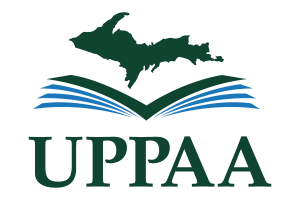UPPAA 2014 Spring Meeting in Marquette, Michigan
Details of the UPPAA’s Spring Meeting in Marquette, Michigan on May 17th, 2014 have just been released. Please register now so you are guaranteed a seat at the event!
The schedule is still tentative but here is the working draft:
10:00 – 10:30 – registration
10:30 – 10:45 – opening remarks
10:45 – 12:00
Children’s Book Industry 101: Terms, Conventions, and How it Works – Carrie Pearson, Shiras Room
Public Speaking 101 – Frida Waara, Community Room
12:00 – 1:00
A Beginner’s Guide to Blogging – Dara Beevas and Amy Quale, Community Room
How to Profit from Your Self-Published Book – Nicole Fende, Shiras Room
1:00 – 2:00 – lunch and short business meeting – election of new officers
2:00 – 3:00 p.m.
How Successful Authors Sell More Books Using Social Media – Dara Beevas and Amy Quale, Community Room
Working with a Bookstore – Lee LaForge, Shiras Room
3:00 – 4:00 p.m.
Working with a Printer vs. Print-On-Demand – Cheryl Corey, Shiras Room
Writing Fiction: Character Development, Point of View, and Plot – Donna Winters, Jenifer Brady, and Tyler Tichelaar, Community Room
4:00 p.m. Networking and cleanup
Session Descriptions:
Children’s Book Industry 101: Terms, Conventions, and How It Works
This is a nuts and bolts session for writers and writer/illustrators to learn how the children’s book industry works. Topics include: standards for traditional publishing (formatting, word counts for categories, conventions, what’s pushy, what’s polite), how the industry works (role of agent vs. editor, publishing houses and what they offer, large house vs. small vs. regional), and how we get paid (advance, royalties).
Public Speaking 101
Frida Waara will draw on her years of experience in public speaking to discuss the basics of engaging your audience when speaking. Besides sharing tips and techniques, she will give feedback to participants who want to practice their short elevator pitches about their books. Participants are asked to attend prepared with a short one minute elevator pitch about their books to be critiqued.
A Beginner’s Guide to Blogging
Blogging is all about getting your voice heard on your terms, but did you also know that it’s a great tool for creating an author platform, connecting with an audience, marketing a project, and even creating content for a book? Discover how you can use a blog’s unstructured format to your advantage and make your voice go viral.
How to Profit from Your Self-Published Book
Self-publishing can be a great way to bring your book to market. Done right it can generate a modest profit (sometimes even before you publish). Done wrong it can be one big money pit. Learn some easy to implement ways to get your book to pay for itself. Presented by self-published author and small business finance expert Nicole Fende, a.k.a. The Numbers Whisperer ™.
How Successful Authors Sell More Books Using Social Media
Subscription lists. Giveaways. Guest posts. Being a bestselling author requires more than just a great book; it requires a bestselling brand. Navigating the waters of social media can make it happen, but you need to know what tips and tricks make it really stick. Some tools are better than others, and this talk will help you discover which ones are right for you.
Working with a Bookstore
Lee LaForge, manager of the Marquette Book World, will share how bookstores decide what books to carry, how you can work with bookstores to get your book in the inventory, ordering and payment policies, book signings, and why customers may choose your book over another, or not.
Working with a Printer vs. Print-On-Demand
Cheryl Corey of book printer McNaughton-Gunn will cover the most recent developments in printing and self-publishing. She will explain what you need to know when working with a printer from paper selection to binding styles, and the pros and cons of using print-on-demand technology versus traditional offset printing.
Writing Fiction: Character Development, Point of View, and Plot
Novelists Donna Winters, Jenifer Brady, and Tyler Tichelaar will discuss three major components of writing fiction—character development, point of view, and plot—including how they make decisions on these components and what is needed to make them effective. They also will share their own writing tips and experiences as well as theories about writing fiction and mistakes people should avoid when writing novels.






